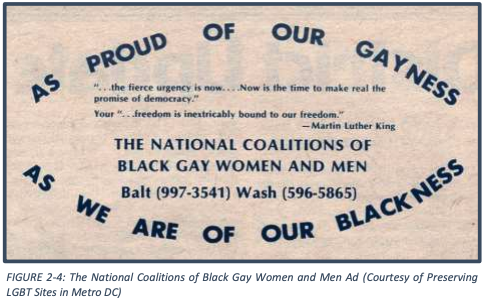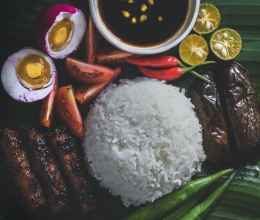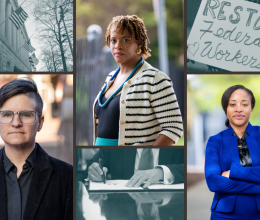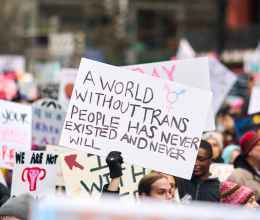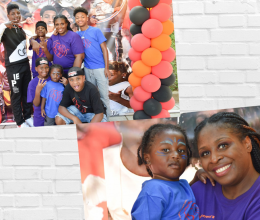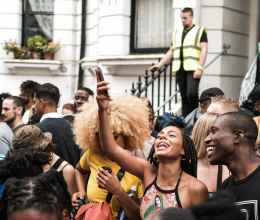
by Dionne "DJ Magic" Ledbetter
For my family, Washington D.C. is a place to discover yourself, your community, and your passion. Growing up, I’d hear my dad and my sister speak with so much reverence for D.C. and about how the District shaped their lives in special ways. I didn’t need to be convinced. After hearing their words all those years, I knew where I was headed.
So, I decided to attend Howard University at 17 years old, and I was curious to find answers for myself. The “discovering my passion” part was easy – I knew it hid somewhere in music. I majored in music composition with hopes of becoming the next John Williams, but my new love of DJing – and my new persona, DJ Magic – was speaking to me in ways that I couldn’t ignore. Discovering myself and my community, though, proved to be more difficult. Like many others, starting college was a crucial moment in my coming-of-age. But it was my sexuality that made this moment much harder than expected.
Living in D.C., in an area culturally known for its large Black population, it was easy to take pride in my Blackness. In my queerness...I struggled. It was hard for me to understand what queerness looked and felt like on me. Even though everyone on the street and in my classes looked like me, I still felt trapped in my identity. That first year in D.C. was so rough that, honestly, I didn’t want to come back for my sophomore year. But there was something so inexplicably rich about D.C. that I couldn’t allow myself to leave so soon. Who knew that the following year, my saving grace would come in an email titled: Please don't play Vogue by Madonna !

The email was from a classmate asking if I could DJ a queer Lover’s Ball at a Northeast art gallery. The subject line was a polite request to avoid the overplayed and assumed theme song of ballroom culture by the general public. Before this, I’d only DJ’d at cookouts, volleyball games, and small house parties for the near-pointless currency of exposure. But my classmate was paying the big bucks this time – $50 to be exact – so I was excited. I brought a handful of friends to the gig, not knowing that the night ahead would change everything I knew about parties, people, and DJing.
It felt like opening another realm. Up until that night, I never saw boys dancing with boys and girls dancing with girls. I never saw that many queer people in one room enjoying themselves with their community. I was no longer in the world of playing line dances and clean edits. That night opened my eyes to what queer spaces could be. It showed me that we don’t have to force ourselves to obey the brutal and severely gendered customs of nightlife. Instead, it was a space where we could exist comfortably outside of the norm. I didn’t have to perform a false image of myself. I was who I was, and that was appreciated.
That night unraveled not only my love for DJing but also DJing for other queer people. We built something freeing, something warm, something loving – just for us. It’s a special thing to be musically responsible for curating great memories at parties, but that’s doubled when it’s for your own community. That night planted the seed in my head that Black queer people need the space to enjoy ourselves not just during Pride, but throughout the year.
The flower that bloomed from that night was Femme Fatale: an LGBTQ+ inclusive celebration of love, power, and strength (here’s a playlist for a taste of the vibe). The following year, I threw its first iteration in a Northeast basement. Little did I know that some of the D.C.’s first Black queer parties in the 1970s were in the basements of homes in the same quadrant. Then later on that year, I was able to throw a few more (in a home that I’m pretty sure had the same flooring as children’s bounce houses). Three years since its inception, Femme Fatale has evolved from sweaty basement walls and champagne-filled storage bins to a standing residency at DC9 in the U Street area.
Femme Fatale is the vehicle that allowed me to come into my own as a queer Black woman and it is my hope that as we continue to grow, we can help people come into their own as well. At its root, this space is a love letter to the breakthrough that allowed me to embrace myself and my identity. And if it wasn't for that Northeast art gallery, I would’ve never discovered what pride is: honest love for yourself and for your community.
More often than not, when Black queer people in D.C. participate in nightlife, they are only presenting half of themselves. Blackness and queerness are rarely embraced simultaneously. However, there is a rich Black queer legacy in D.C. The District is home to the nation’s first black LGBT political advocacy group: the D.C. Coalition of Black Lesbians, Gays and Bisexuals. D.C. is also the home of the earliest Black Pride celebration, which took place at Banneker Field in 1991.
We have always played an important role in the development and preservation of our culture, and I think it’s our duty to contribute to that legacy, doing whatever we can to ensure its perpetuity. Black queer environments as a whole give us a break from our hardships. As one such space, Femme Fatale gives us an opportunity to build a culture and be a part of a community that is essentially bonded by music.
And more than anything, these environments allow us to recognize that we are worthy of a loving space to celebrate both our Blackness and our queerness at the same time, all year round.
If any of this resonated, I warmly invite you to a Femme Fatale party so you and others can also build something freeing, warm, and loving – just for us. The next event is this Friday, June 10. But if you want to support our future shows, follow us on Instagram!
